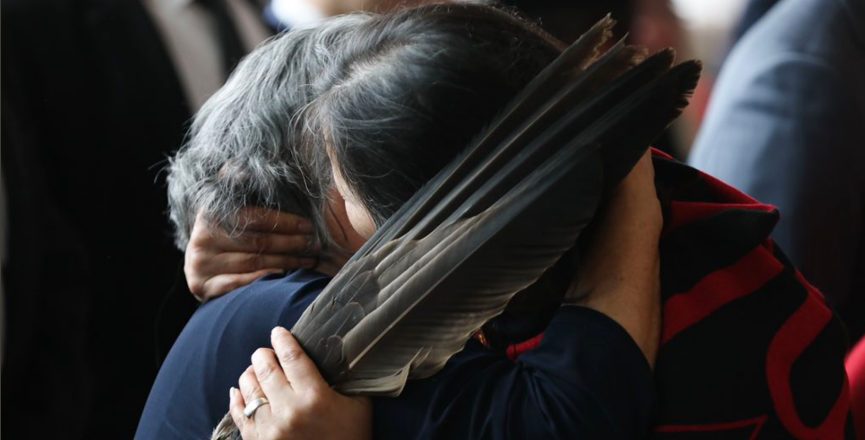In the 1950s, Frantz Fanon, the famous psychiatrist and philosopher from Martinique, reported on the French colonial administration officials discussing the Algerians and quoted them saying, “if we want to strike Algerian society in its structure, in its faculty of resistance, we first have to conquer its women, we have to look for them behind their veils, where they hide themselves and in their house where the men hide them.”
What Fanon reported was not a simple and harmless note between French bureaucrats, it was an entire structured policy that was implemented in the French-colonized land of Algeria since 1830. The policy that clearly targeted women, seen as the carriers of the Algerian culture, was accompanied on the ground by tanks and artillery targeting men. It was only in 1962, that Algeria gained its independence from France, after a long, brutal and violent war.
This week, in Ottawa, the National Inquiry into Missing and Murdered Indigenous Women and Girls, submitted its long-awaited report. Years ago, already, in 2004, Amnesty International Canada called the disappeared and murdered Indigenous women, the “Stolen Sisters.”
In 2012, the RCMP reported the number of Indigenous women and girls who disappeared or were murdered as 1,182.
The new report speaks of thousands of women with a similar fate. Unfortunately, we will never know exactly how many. As if neither the lives nor the tragic deaths of these women and girls really mattered. Many other women were probably murdered and killed with no one reporting their disappearance, or worse, their disappearances were probably hidden.
The inquiry found that Indigenous women and girls are “12 times more likely to be murdered or missing than any other women in Canada, and 16 times more likely than Caucasian women.”
Despite the cultural and geographic differences between Algerian women and Indigenous women, both groups were victims of brutal and ruthless colonialist administration. The French in the case of Algerian women, and the Canadian in the case of Indigenous women. Both were abused by police officers; both have seen their native languages banned from being taught at homes and in schools and both were targeted as they were seen as the heart of the Algerian and Indigenous family, respectively.
Under the pretext of liberating women from the oppression of their male relatives and pretending to welcome them into the world of civilization and legal rights, many Algerian women were forced to remove their veils. Their religion, Islam, was identified by the French colonialist institutions as the main source of their oppression and backwardness. Many Algerians grew up not learning Arabic, or being ashamed of speaking it.
In the case of Indigenous women, many who were fleeing domestic violence from some men in their communities (another product of colonialism and difficult economic factors) were taken advantage of by either police officers or on the road by white men who would sexually abuse them and then would kill them. Many Indigenous women would be described as “loose” or “drug addicts” or “submissive” so according to this highly biased and discriminating description, who would be bothered by their deaths anyway?
In the case of Algeria, up to today France has never admitted its war crimes in Algeria. The word genocide was never pronounced by any French politicians. The closest French politicians came was admitting to the killing and torture of Maurice Audin, a French communist who was supporting the fight for independence.
Today, Canada has a choice. It can continue to look away and praise itself as one of the best places in the world and quietly put the report on the shelf like it has in the past for all the previous reports (the Royal commission on Aboriginal peoples, and the public commission of inquiry into missing women in B.C. in 2012).
Or, it can decide to be courageous and brave and start decolonizing its institutions starting from stopping the abusive and racial profiling practices used by some local police forces, to overcoming the general apathy and complacency of the RCMP, to repealing the mother of all evil, the Indian Act.
Like any radical change, this decolonization process wouldn’t be easy or popular to adopt. Already, most of the major newspapers in Canada are, since the release of the report, aligning with editorial after editorial and opinion after opinion against the word “genocide” used in the report. Many have been acting offended and choosing to focus on the word genocide, while all the crucial issues discussed in the report have seemed already to be once again forgotten.
Monia Mazigh was born and raised in Tunisia and immigrated to Canada in 1991. Mazigh was catapulted onto the public stage in 2002 when her husband, Maher Arar, was deported to Syria where he was tortured and held without charge for over a year. She campaigned tirelessly for his release. Mazigh holds a PhD in finance from McGill University. In 2008, she published a memoir, Hope and Despair, about her pursuit of justice, and recently, a novel about Muslim women, Mirrors and Mirages. In 2017, she published Hope Has Two Daughters, a novel about the Arab Spring. You can follow her on Twitter @MoniaMazigh or on her blog www.moniamazigh.com
Photo: Justin Trudeau/Twitter
Make rabble sustainable. Please consider supporting our work with a monthly donation and join us as we take on the 2019 election. Support rabble.ca today for as little as $1 per month!




